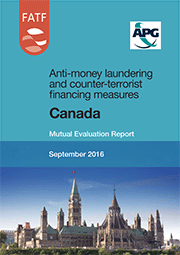15 September 2016 - Canada has a strong anti-money laundering and combating the financing of terrorism (AML/CFT) regime which achieves good results in some areas but requires further improvements to be fully effective.
The International Monetary Fund conducted a detailed mutual evaluation of Canada.
Canada faces important money laundering and, to a lesser extent, terrorist financing risks. The authorities have a good understanding of these risks and have put a number of mitigating measures in place. The AML/CFT regime covers all high-risk areas, except legal counsels, legal firms and Quebec notaries; the Supreme Court declared AML/CFT measures inoperative in their respect. The lack of coverage of these professions is a significant loophole in Canada’s AML/CFT framework and raises serious concerns. Legal persons and arrangements are at high risk of misuse for money laundering or terrorist financing purposes, and that risk is not satisfactorily mitigated.
Constitutional constraints limit the analysis that Canada’s financial intelligence unit, FINTRAC, can conduct. The fact that FINTRAC is not authorized to request information from any reporting entity creates a gap, however, FINTRAC does cooperate effectively with law enforcement agencies.
The Canadian authorities have achieved some success in combating money laundering, notably when conducting law enforcement efforts with the support of FINTRAC’s analysis. However, these efforts are not entirely in line with the money laundering risks that Canada faces, and overall, the recovery of proceeds of crime appears to be relatively low. Counter-terrorist financing efforts are more in line with Canada’s risk profile. There is effective cooperation of government bodies, good supervision of reporting entities and effective measures are in place to prevent terrorists from raising, using and moving funds. Canada accords priority to pursuing terrorism, with terrorist financing being one of the key components of its counter-terrorism strategy.
Financial institutions, including Canada’s six domestic systemically important banks, generally apply adequate measures to mitigate the money laundering and terrorist financing risks that they face. Designated non-financial businesses and professions, however, are not as effective in their implementation of AML/CFT measures. The financial and non-financial sectors are subject to appropriate risk-sensitive AML/CFT supervision, but further supervisory efforts are necessary with respect to the real estate and dealers in precious metals and stones sectors.
The Canadian authorities cooperate effectively and frequently with their foreign counterparts. Canada has a strong framework for mutual legal assistance and extradition which it adequately uses in the fight against terrorist financing and, albeit to a somewhat lesser extent, money laundering.
This report was adopted by the FATF at its Plenary meeting in June 2016.


 Twitter
Twitter
 Facebook
Facebook
 Instagram
Instagram
 Linkedin
Linkedin
